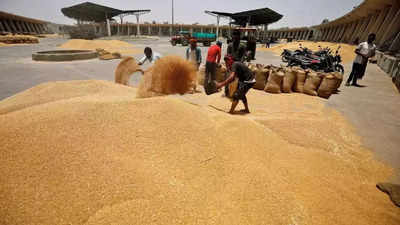BHOPAL: Around 9 lakh quintals of foodgrains — enough to feed all of Madhya Pradesh for nearly a month — have rotten away in govt warehouses. Much of it is now not even worth cattle feed.
This, in a country that ranks 105 on Global Hunger Index (far below countries like Ethiopia) and in a state where over 26% of kids under 5 are underweight — the worst in the country, as per a reply in Lok Sabha.
MP state civil supplies corporation, which ensures distribution of foodgrains through public distribution system, had to issue tenders to sell these rotten foodgrains so that at least some portion of the cost is recovered. Over 90% of it is wheat.
Such tenders were issued at least four times in 2024, between March 13 and Nov 5. The corporation sold around 8.9 lakh quintals of foodgrains this way, excluding some stale rice that too was sold in small quantities.
Asked about this, minister for food and civil supplies, Govind Singh Rajput told TOI, “It is an old matter, which has come to my notice only now. I have instructed officials that there should be no such recurrence. I have also ordered that insurance companies should be roped in to cover such things. We are framing a new insurance policy that includes coverage for such scenarios. In the meantime I have also instructed that inspections should be carried out from time to time and strict action should be taken against those who are responsible.”
“How much govt lost by selling these stale foodgrains depends on several factors, like the year in which it was procured, the cost of procurement that year, storage cost, transportation cost and the category under which it was sold. Overall, rough estimates say these 9 lakh quintals will lead to a loss of around Rs 200 crore,” said a source.
Asked for his comment on the issue, managing director of civil supplies corporation, Pratap Narayan Yadav said, “Whatever the difference between revenue generated from sale of these foodgrains and cost incurred, will be recovered from the payables of the state warehousing and logistics corporation.”
The rotten foodgrains that were sold were divided into five categories: feed I, feed II, (both considered fit for cattle feed), feed III (for poultry feed), industrial and manure use (not even fit for cattle or poultry) and manure category (not even fit for any industrial use).
These foodgrains are not only from recent years but as far back as 2018-19. Foodgrains were getting spoiled, and fare for storage was also piling up, so a drive was initiated to clear such stocks and clean the books, a source said.
Foodgrains are procured from farmers through co-operative societies, and then transported to warehouses run by state warehousing and logistics corporation. The transportation costs, fare for storage, and commission for procurement is paid by civil supplies corporation.
MD of MP warehousing and logistics corporation Sibi Chakravorty couldn’t be contacted as he is on leave. An official of the corporation, requesting anonymity, said, “If the warehouse is in a joint venture, then losses are recovered from the owners. If it is govt-owned, then recovery is done from employees. It is the responsibility of civil supplies corporation to pick up the foodgrains on time. If they fail to do so, the grains get damaged.”
To put the loss of 9 lakh quintals of foodgrains in perspective, wheat allotment for the entire state in Jan 2025 is around 11 lakh quintals. As per a reply in Lok Sabha last year, as of Oct 2023, 26.5% children in Madhya Pradesh aged below 5 years were underweight — this was highest in the country.




